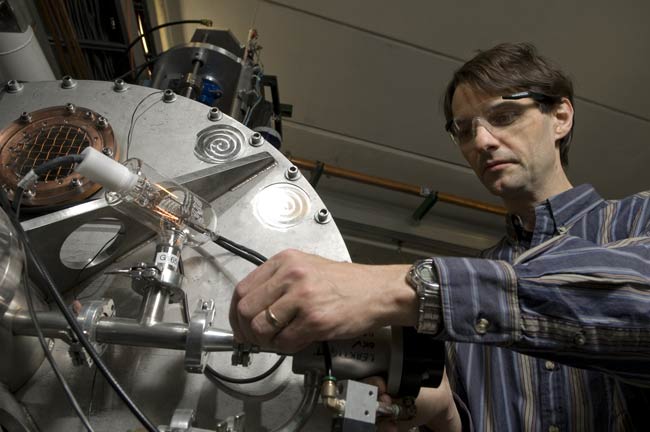Honesty Guides Scientist to 'Holy Grail' of Physics

Editor's Note: ScienceLives is an occasional series that puts scientists under the microscope to find out what makes them tick. The series is a cooperation between the National Science Foundation and LiveScience.
Name: Daniel Bazin Age: 47 Institution: Michigan State University, National Superconducting Cyclotron Laboratory Field of Study: Nuclear Physics
With help from a new device called the Radio Frequency Fragment Separator and other equipment recently developed with NSF funding, researchers at the Michigan State University National Superconducting Cyclotron Laboratory have made first-of-their-kind measurements of several rare atomic nuclei, including tin-100 (an isotope of tin with a total of 100 protons and neutrons in its nucleus), a "holy grail" of experimental nuclear physics. The discoveries will help to refine theoretical models about how elements are created in the cosmos. Until now, this was beyond the technical reach of nearly all of the world's nuclear science facilities. One member of the research team, nuclear physicist Daniel Bazin, explains the findings in a video (http://www.youtube.com/watch?v=Tpug_SLw3wA&feature=channel_page/) and a press release and answers the ScienceLives' 10 questions below. What inspired you to choose this field of study? I started studying applied solid state physics in 1979 when I was a graduate student in engineering at the University of Rennes, France. During my last year I did a six-month internship at the GANIL heavy-ion accelerator in Caen, France, which had just begun operations a few years ago. It was my first real exposure to fundamental research and the field of nuclear physics in particular. At GANIL, I was involved in some of the first experiments looking for exotic nuclei produced via heavy-ion fragmentation. This was a very exciting time of new discoveries and prospects. I became fascinated with the properties of the atomic nucleus, which combines the most mysterious and challenging fields of physics: quantum mechanics, strong and weak interactions, and many-body problems.
What is the best piece of advice you ever received? Being a scientist requires a great deal of intellectual discipline and honesty. Many of my mentors have showed me how to be a good scientist by keeping in mind these two qualities.
What was your first scientific experiment as a child? I always took things apart when I was a child, and rarely managed to put them back together, but I remember building a crude electric motor and suddenly understanding how it worked.
What is your favorite thing about being a scientist or researcher? If I had to choose a favorite aspect among the many enjoyable facets of being a scientist, I would put on top of the list sharing a common passion with very smart people all over the world.
What is the most important characteristic a scientist must demonstrate in order to be an effective scientist? Discipline and honesty. A good scientific result or theory has to be reproduced or tested by peers. Any human bias in the process leads to a huge waste in resources and time. Examples are numerous.
Get the world’s most fascinating discoveries delivered straight to your inbox.
What are the societal benefits of your research? Nuclear science research can appear like highly esoteric activity led by people who are the only ones understanding rather inscrutable phenomena. However, it's basic science researchers, driven by sheer curiosity about nature and the universe, who produce fundament new knowledge. There are countless examples of the repercussions of this knowledge in technology, biology, medicine and so forth which demonstrate the essential role of research in society. In the case of my research, the most direct benefit is the use of accelerator technology to treat cancer. See, for example, this 2007 article in The New York Times: http://www.nytimes.com/2007/12/26/business/26proton.html.
Who has had the most influence on your thinking as a researcher? Since my beginnings as a scientist 20 years ago, I have always had a great admiration for Gregers Hansen, who spent his last years at NSCL and unfortunately passed away three years ago. His great sense of scientific rigor, combined with a clear view of the path forward, has always inspired me.
What about your field or being a scientist do you think would surprise people the most? I think what most people don’t realize is that a scientific community is like a worldwide family. After several years spent in a particular field, you get to know pretty much everybody who is working on the same subjects as you do.
If you could only rescue one thing from your burning office or lab, what would it be? My backup disk!
What music do you play most often in your lab or car? I am an amateur classical pianist, so of course I enjoy listening to it as well. (Editor's note: Clips of Bazin playing a piano duo with his wife, a professional musician, at an MSU recital are available at: http://web.mac.com/bazin/Music/Duo_Recital_2006.html.)


